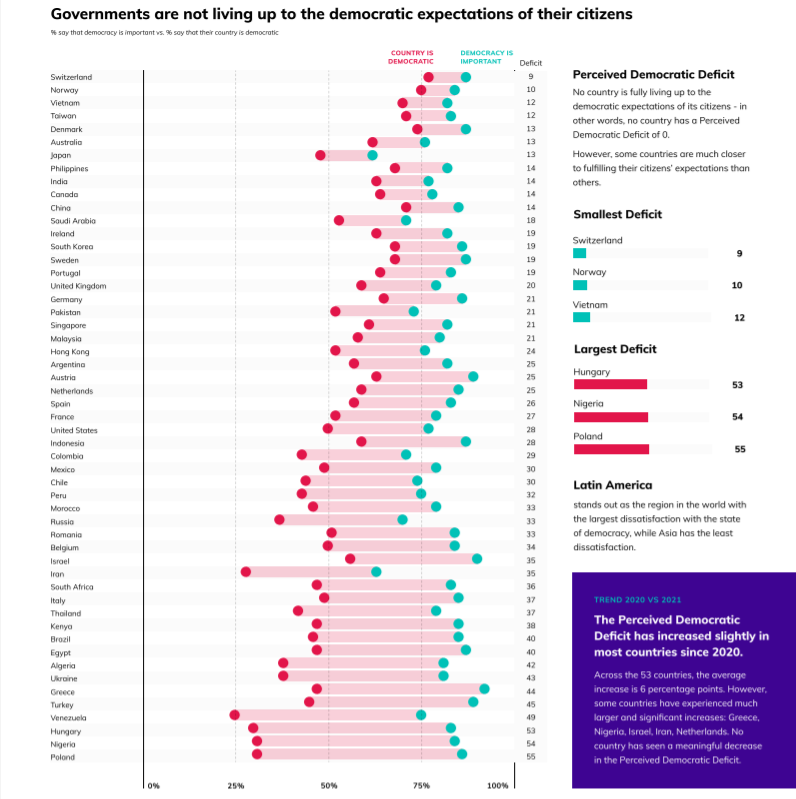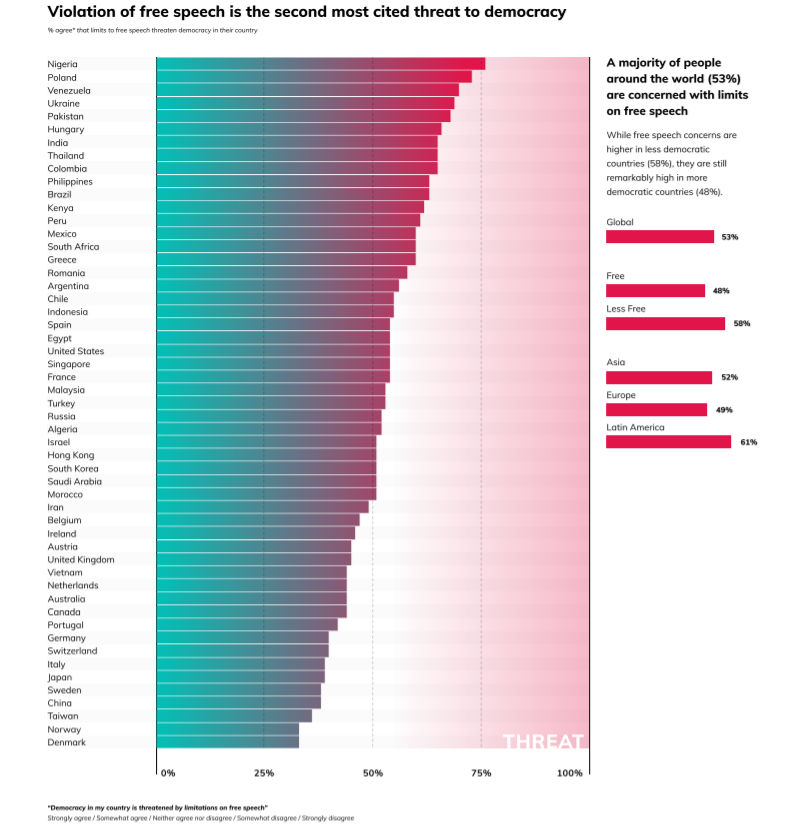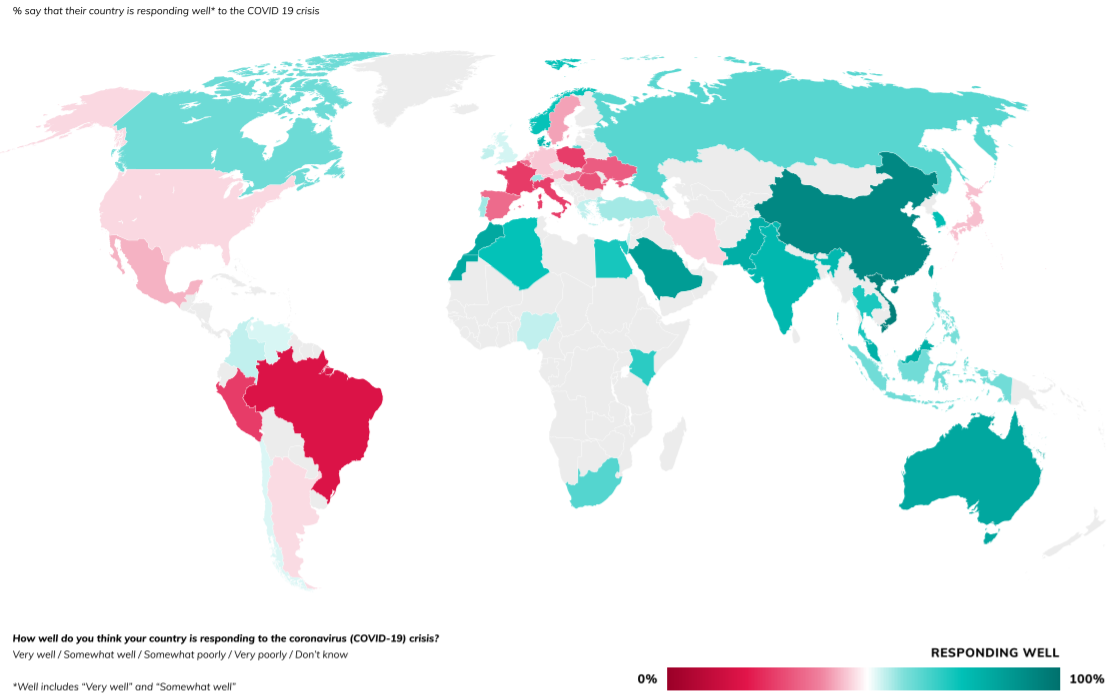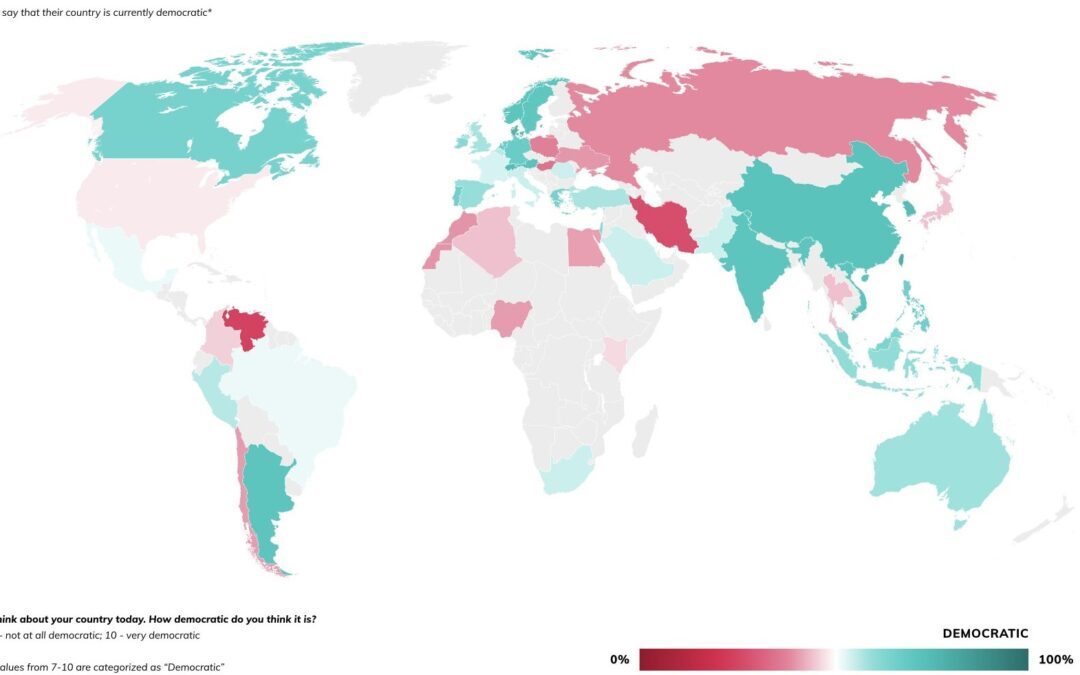Less than one third of Poles think their country is democratic, and Poland has the world’s largest “perceived democratic deficit”, according to a new study published by the Alliance of Democracies (AoD). It also finds most Poles to be unhappy with how their government has handled the COVID-19 pandemic.
In the latest version of its Democracy Perception Index, AoD, which was founded and is chaired by former NATO secretary general Anders Fogh Rasmussen, surveyed over 53,000 respondents in 53 countries (representing 75% of the world’s population) between February and April this year.
Today @LatanaBrand and @AoDemocracies publish the fourth Democracy Perception Index – the world’s largest annual study on democracy – 50,000 people in 53 countries. Below a thread on some of the findings: pic.twitter.com/RsAbesTQFq
— Anders Fogh Rasmussen (@AndersFoghR) May 5, 2021
AoD found that only 31% of Poles think their country is democratic. That is down from 39% in 2019 (the first time the question was asked) and 38% in 2020. Among all countries surveyed this year, only Venezuela (25%), Iran (28%) and Hungary (30%) have lower scores than Poland.
By contrast, the highest proportions of people who think that their country is democratic were found in Denmark (77%), Switzerland (75%) and Norway (71%). Meanwhile, in Poland 66% of people say that there is “not enough democracy” in their country, up from 59% last year and 55% in 2019.
AoD also notes that Poland has the largest “perceived democratic deficit”: the difference between the proportion of people who say democracy is important (which in Poland is 86%) and those who say their country actually has democracy. Poland’s gap of 55 percentage points is followed by Nigeria (54 p.p.) and Hungary (53 p.p.).

When asked about specific threats, 73% of Poles agreed that “democracy in my country is threatened by limits to free speech”. That was the second highest among all countries surveyed, behind only Nigeria (76%) and well above the global average of 53%.
Over two thirds (67%) of Poles also believe that “unfair elections and/or electoral fraud” are a threat to democracy in their country. That was the 11th highest among all countries and above the global average of 49%.
By contrast, relatively few Poles (37%) thought that the power of big tech companies is a threat to democracy in their country. That was the joint-third lowest among all countries – equal with Ukraine and above only Russia (35%) and Venezuela (31%) – and well below the global average of 48%.
Poland was also the only country other than Ukraine in which more people regard Russian influence as a greater threat to their democracy (40%) than Chinese (27%) or US (34%) influence.

Only 27% of Poles said they are satisfied with their government’s response to the COVID-19 pandemic. That was the joint second lowest (with Peru) among all countries. Brazil (19%) was in last place, while Vietnam (96%), China (93%) and Taiwan (86%) topped the ranking.
It also marks a significant change from last spring, when 57% of Poles said their government was responding well to coronavirus. That 30 percentage point annual drop was among the highest recorded in any country.
Exactly two thirds of Poles said that their government has “done too much to limit people’s freedoms during the coronavirus crisis”, the joint ninth highest among all countries surveyed.

Poland has in recent years fallen sharply in a number of global rankings of democracy, as the ruling national-conservative Law and Justice (PiS) party has implemented changes to the judiciary and media that are seen to have undermined the rule of law, freedoms and rights.
Last week, Freedom House reported that Poland has recorded the largest recent decline in democracy among 29 countries in the Central and Eastern Europe and Central Asia. As of last year, the NGO has no longer classifies Poland as a full democracy.
Last month, Poland fell to its lowest ever position in the World Press Freedom Index compiled annually by Reporters Without Borders. Conservative US think tanks the Heritage Foundation and the Cato Institute have also found Poland to have fallen sharply in their respective Index of Economic Freedom and Human Freedom Index.
In Poland itself, opinion polls have regularly found that a majority of the public view PiS’s judicial policies as an attempt to violate the rule of law.
PiS and its supporters, however, argue that their reforms have been necessary because of the longstanding failure since 1989 to remove “post-communists” and their allies from powerful positions in the judiciary, media, business and other spheres.
They also say that their policies towards the media have been part of a necessary rebalancing of a landscape that was previously dominated by liberal-leaning outlets, many of which have foreign ownership.
“We are still cleansing Poland of dirt,” said President Andrzej Duda last year. This week, he accused Poland’s human rights commissioner, Adam Bodnar, of “anti-Polish” rhetoric because Bodnar told international media that the country is heading “in the direction of an undemocratic state”.
All image credits: Alliance of Democracies/Latana/Democracy Perception Index 2021

Daniel Tilles is editor-in-chief of Notes from Poland. He has written on Polish affairs for a wide range of publications, including Foreign Policy, POLITICO Europe, EUobserver and Dziennik Gazeta Prawna.




















